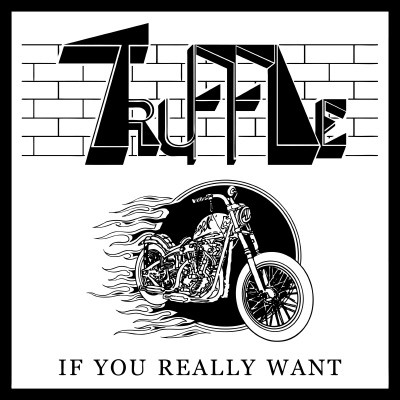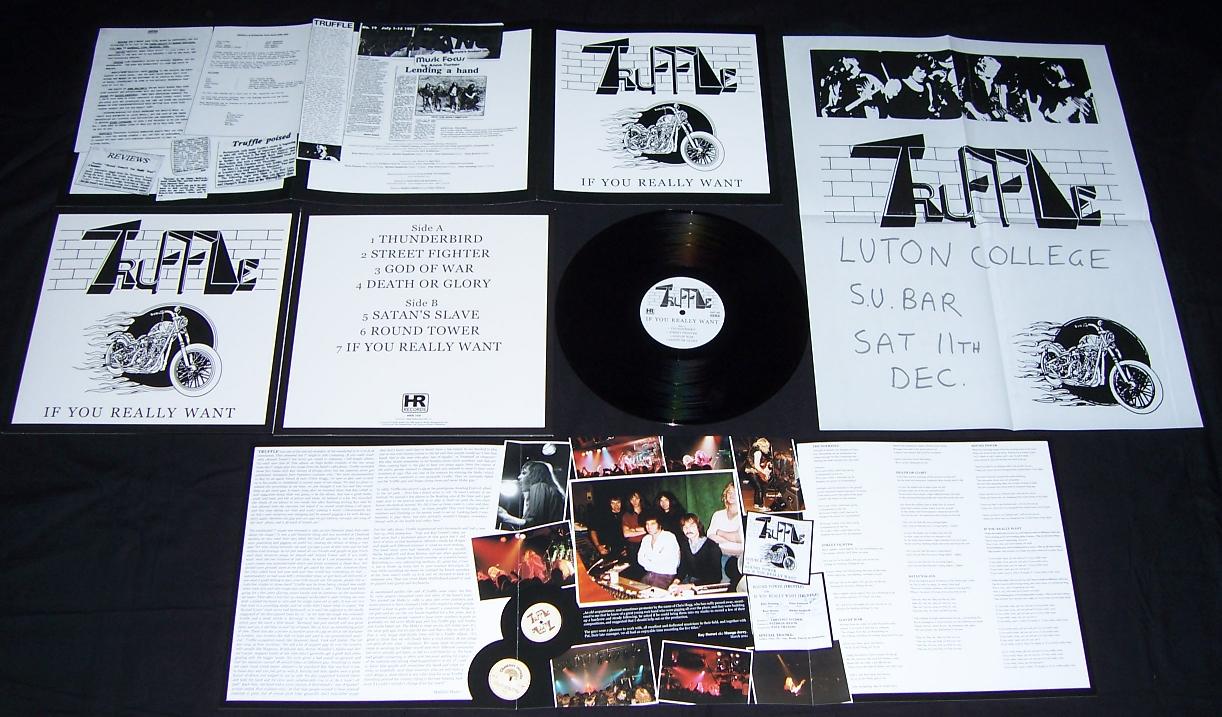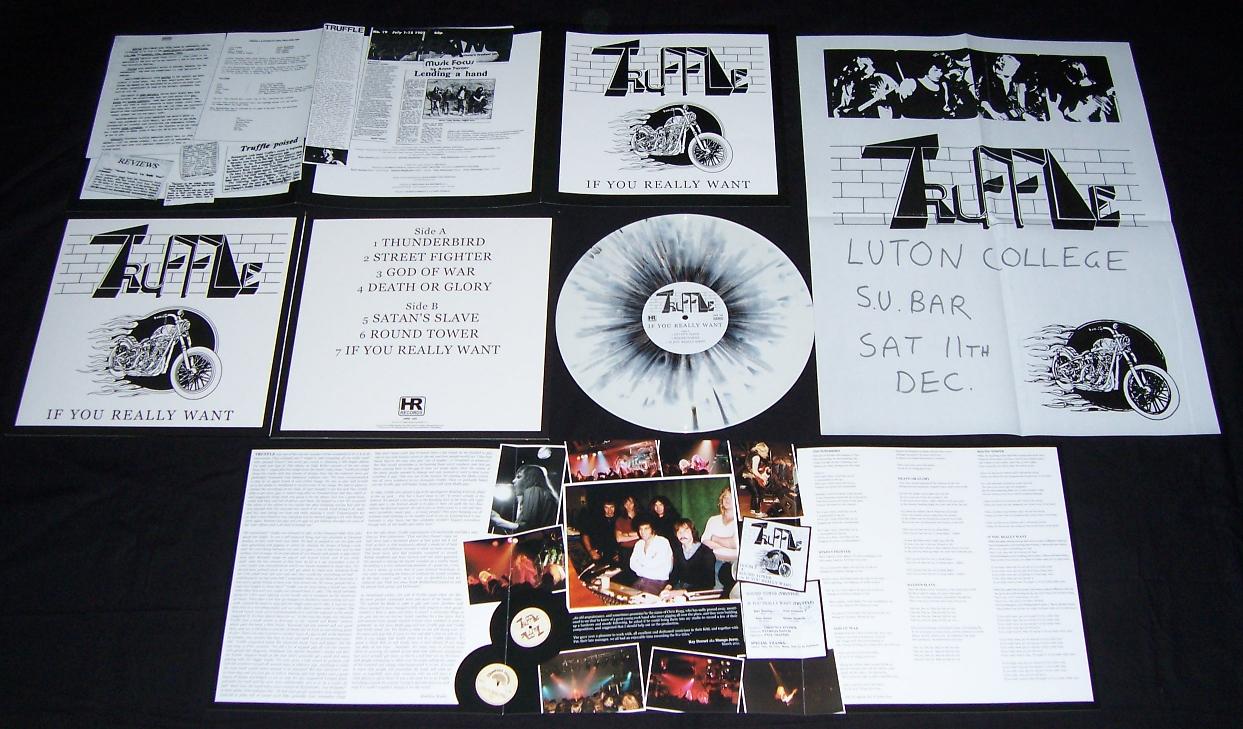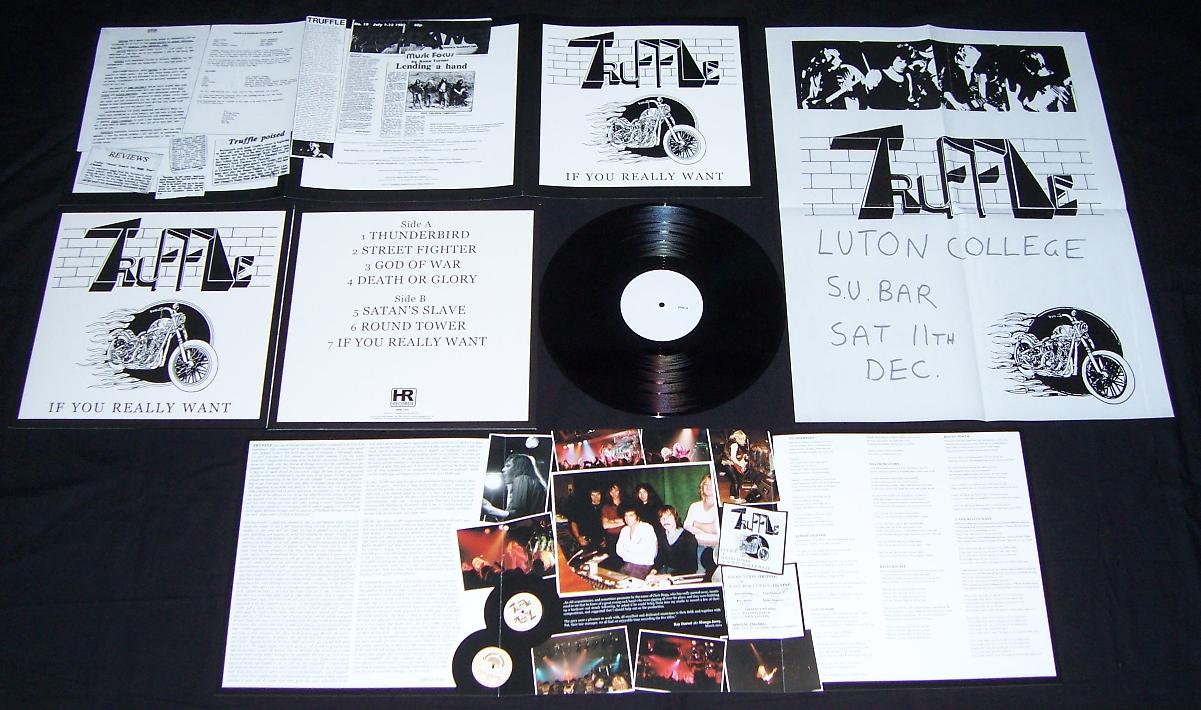 | ||||
| TRUFFLE - If You Really Want LP | |
HRR 169, limited to 500 copies, 150 x white/ black splatter vinyl, 6 page insert, poster | |
| Russ Horton - Bass / Lead vocals Ritchie Stopforth - Guitar / vocals Pete Patterson - Drums John Bowyer - Guitar John Dunning - Guitar / vocals (tracks 6 + 7) | |
| -Thunderbird -Street Fighter -God Of War -Death Or Glory -Satan's Slave -Round Tower -If You Really Want | |
SOLD OUT! | |
Truffle was one of the one-hit wonders of the wonderful N.W.O.B.H.M. movement. They released one 7" single in 1981 (coupling "If you really want" with "Round Tower") but never got round to releasing a full-length album. Up until now that is! This album on High Roller consists of the two songs from the 7" single plus five songs from the band’s 1983 demo. Truffle recorded those five tracks with Ray Dorset of Mungo Jerry but the material never got published. Drummer Pete Patterson explains why: “We were recommended to Ray by an agent friend of ours (Chris Hogg). He saw us play and invited us to his studio in Hindhead to record some of our songs. We had no plans to release the recordings at the time, we just thought it was fun and they would help us get more gigs. It wasn’t long after we finished them that Ray called us and suggested doing what was going to be the album. Ray was a great bloke, really laid back and full of advice and ideas. He helped us a lot. We recorded the whole of the album in two weeks but after finishing mixing Ray said he was pleased with the outcome but asked if we would mind doing it all again and this time taking our time and really making it work? Unfortunately for us, Ray’s own situation was changing and he started gigging a lot with Mungo Jerry again. Between his gigs and our gigs we got halfway through one song of the ‘new’ album and it all kind of fizzled out.”
The mentioned 7" single was released in 1981 on the Chestnut label. Pete talks about the single: “It was a self-financed thing and was recorded at Chestnut studios, so they used their own label. We had all packed in our day jobs and were practising and gigging an awful lot, chasing the dream of being a rock star! We were doing between 100 and 150 gigs a year at that time and we had written a lot of songs. So we just asked all our friends and people at gigs which were their favourite songs we played and ‘Round Tower’ and ‘If you really want’ were the two winners at that time. As far as I can remember, a run of 1,000 copies was manufactured which was kinda standard in those days. We should have pressed more as we still get asked for them now. Someone from the USA called back last year and said they would buy everything we had ... unfortunately we had none left! I remember when we got them all delivered, it was such a great feeling to have your first record out. Of course, people did actualy buy singles in those days!” Truffle was far from being a brand new outfit when their first and only single was released back in 1981: “The band had been going for a few years playing covers locally and in Germany on the American air bases. Then after a few line up changes we decided to start writing our own stuff. I joined the band in 1979 and the single came out in 1981. It was our very first time in a recording studio and we really didn’t know what to expect. The ‘Round Tower’ track never had keyboards on it until the engineer in the studio suggested it! He then played them for us.” At the time the single was released, Truffle had a small article in Kerrang! in the “Armed and Ready” section, which gave the band a little boost: “Kerrang! had just started and was great then, and yes, it did help us and lots of bands like us from an advertising point of view. There was also a review in another issue of a gig we did at the Marquee in London. Any reviews like that we kept and used in our promotional material.” Truffle supported bands like Diamond Head, Tank and Spider. The list was long, as Pete recounts: “We did a lot of support gigs all over the country with people like Magnum, Wishbone Ash, Bernie Marsden’s Alaska and Bernie Tormé. Support bands at the time didn’t generally get a good deal when playing with the bigger bands. We were given a bad sound on purpose and had the monitors turned off several times at different gigs. Anything to make the main band sound better seemed to be standard! But that was how it was in those days and you just got on with it. Having said that, Spider were a great bunch of blokes and helped us out no end. We also supported Twisted Sister and both the band and the crew were unbelievably nice to us. So it wasn’t all bad!” Back then, the band had a cover version of Motörhead’s “Ace of Spades” in their setlist. Pete explains why: “At that time people wanted to hear original material in pubs, but of course most folks generally don’t remember songs they don’t know until they’ve heard them a few times! So we decided to play one or two well-known covers in the set and then people would say ‘I like that band, they’re the ones who play ‘Ace of Spades’, or ‘Freebird’ or whatever’! But they would remember us for hearing those cover numbers and that got them coming back to the gigs to hear our songs again. Over the course of the years, people seemed to change and only seemed to want to hear cover numbers at gigs. This was one of the reasons for starting the Mafia (which was all cover numbers) to run alongside Truffle. Then we gradually faded out the Truffle gigs and began doing more and more Mafia gigs.”
In 1983, Truffle also played a gig at the prestigeous Reading Festival, albeit in the car park ... Pete has a funny story to tell: “It wasn’t actualy at the festival. We played a few places in the Reading area at the time and a pub right next to the festival asked us to play in their car park the two days before the festival started. We did it two or three years in a row and they were incredible, manic gigs ... so many people! They were hanging out of windows and climbing on the nearby roofs to see us. Looking back it was fantastic to play them, but they probably wouldn’t happen nowadays though with all the health and safety laws.”
For the 1983 demo, Truffle experienced with keyboards and had a new line-up. Pete elaborates: “That was Ray Dorset’s idea, we had never had a keyboard player at that point but it did kind of show us that keyboards offered a whole lot of light and shade and different textures to what we were writing.
The band since 1979 had basically consisted on myself, Richie Stopforth and Russ Horton and one other guitarist. We seemed to change the fourth member on a weekly basis! Recording is a very unforgiving medium. It’s great fun, I love it, but it shows up every flaw in your musical technique. It was while recording the demo we realised the fourth member at the time wasn’t really up to it and we decided to look for someone else. That was when Mark Mullholland joined us and he played both guitar and keyboards.”
As mentioned earlier, the end of Truffle came when the Mafia cover project consumed more and more of the band’s time: “We started the Mafia in 1986 to play just cover numbers and times seemed to have changed a little with respect to what people wanted to hear in pubs and clubs. It wasn’t a conscious thing on our part and we ran the two bands together for a few years. But it just seemed more people wanted to hear cover numbers in pubs so gradually we did more Mafia gigs and less Truffle gigs and Truffle just kinda faded out. The Mafia is what we are still doing now. It’s the same pub gigs but it’s just for fun and that’s why we still do it.”
Pete is very happy that finally there will be a Truffle album: “It’s great to think that we will finally have a vinyl album of our songs out after all this time ... fantastic. We came close on several occasions to securing the fabled record deal with different companies but never actually got there, so this is a real blast for us. We have had people contacting us often over the years asking for copies of the material and asking what happenned to us etc. It’s cool to know that people still remember the band and what we were, so hopefully next time someone asks we will have a vinyl album to show them! It was a fun time for us as Truffle travelling around the country trying to become famous, and even if I could I wouldn’t change it for the world.”
Matthias Mader


